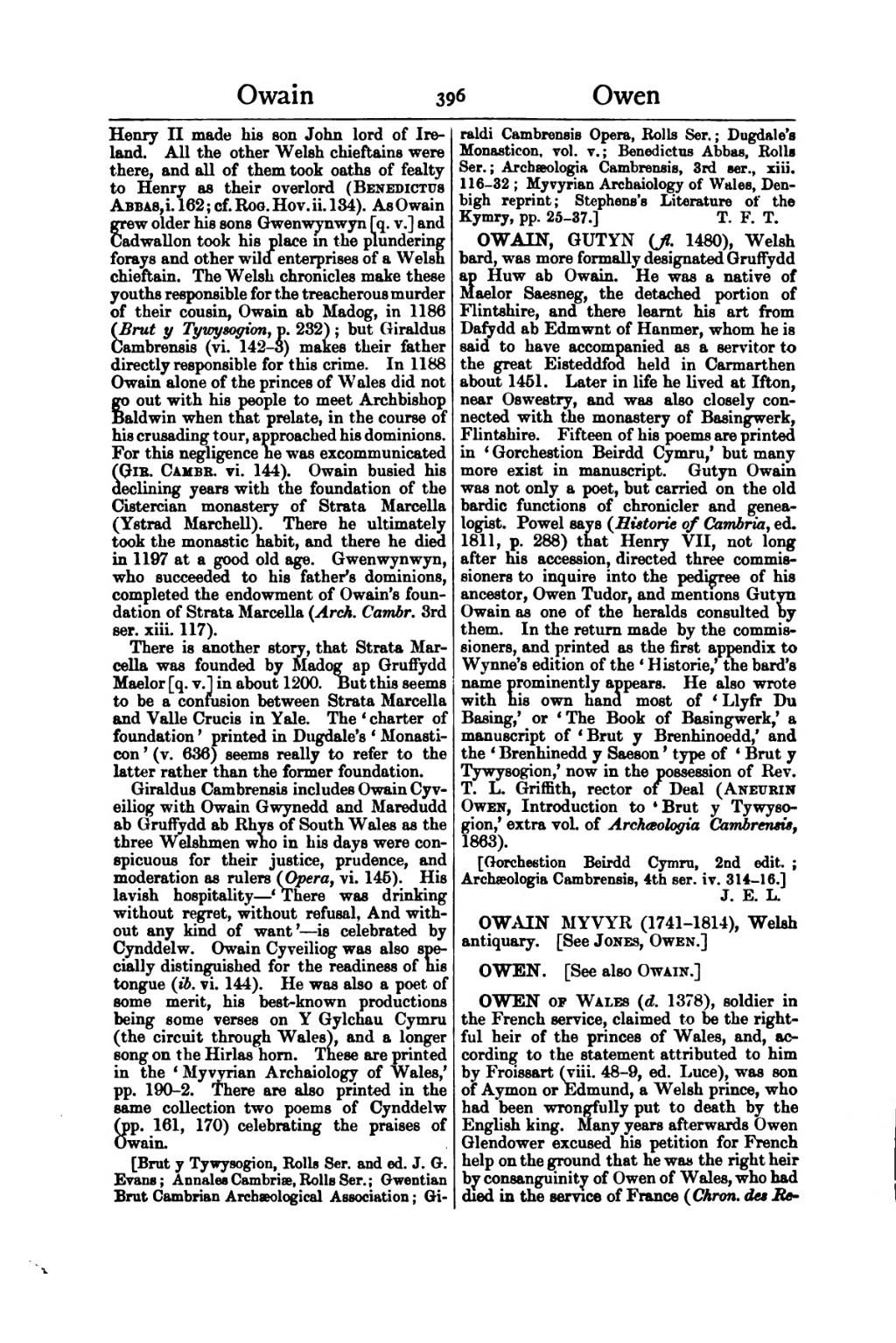Henry II made his son John lord of Ireland. All the other Welsh chieftains were there, and all of them took oaths of fealty to Henry as their overlord (Benedictus Abbas, i. 162; cf. Rog. Hov. ii. 134). As Owain grew older his sons Gwenwynwyn [q. v.] and Cadwallon took his place in the plundering forays and other wild enterprises of a Welsh chieftain. The Welsh chronicles make these youths responsible for the treacherous murder of their cousin, Owain ab Madog, in 1186 (Brut y Tywysogion, p. 232); but Giraldus Cambrensis (vi. 142-3) makes their father directly responsible for this crime. In 1188 Owain alone of the princes of Wales did not go out with his people to meet Archbishop Baldwin when that prelate, in the course of his crusading tour, approached his dominions. For this negligence he was excommunicated (Gir. Cambr. vi. 144). Owain busied his declining years with the foundation of the Cistercian monastery of Strata Marcella (Ystrad Marchell). There he ultimately took the monastic habit, and there he died in 1197 at a good old age. Gwenwynwyn, who succeeded to his father's dominions, completed the endowment of Owain's foundation of Strata Marcella (Arch. Cambr. 3rd ser. xiii. 117).
There is another story, that Strata Marcella was founded by Madog ap Gruffydd Maelor [q. v.] in about 1200. But this seems to be a confusion between Strata Marcella and Valle Crucis in Yale. The 'charter of foundation ' printed in Dugdale's 'Monasticon' (v. 636) seems really to refer to the latter rather than the former foundation.
Giraldus Cambrensis includes Owain Cyveiliog with Owain Gwynedd and Maredudd ab Gruflydd ab Rhys of South Wales as the three Welshmen who in his days were conspicuous for their justice, prudence, and moderation as rulers (Opera, vi. 146). His lavish hospitality — 'There was drinking without regret, without refusal, And without any kind of want' — is celebrated by Cynddelw. Owain Cy veiliog was also specially distinguished for the readiness of his tongue (ib. vi. 144). He was also a poet of some merit, his best-known productions being some verses on Y Gylchau Cymru (the circuit through Wales), and a longer song on the Hirlas horn. Tnese are printed in the 'Myvyrian Archæology of Wales,' pp. 190-2. There are also printed in the same collection two poems of Cynddelw (pp. 161, 170) celebrating the praises of Owain.
[Brut y Tywysogion, Rolls Ser. and ed. J. G. Evans; Annales Cambriae, Rolls Ser.; Gwentian Brut Cambrian Archaeological Association; Giraldi Cambrensis Opera, Rolls Ser.; Dugdale's Monasticon, vol. v.; Benedictus Abbas, Rolls Ser.; Archseologia Cambrensis, 3rd ser., xiii. 116-32; My vyrian Archaiology of Wales, Denbigh reprint; Stephens's Literature of the Kymry, pp. 25-37.]
OWAIN, GUTYN (fl. 1480), Welsh bard, was more formally designated Gruflydd ap Huw ab Owain. He was a native of Maelor Saesneg, the detached portion of Flintshire, and there learnt his art from Dafydd ab Edmwnt of Hanmer, whom he is said to have accompanied as a servitor to the great Eisteddfod held in Carmarthen about 1451. Later in life he lived at Ifton, near Oswestry, and was also closely connected with the monastery of Basingwerk, Flintshire. Fifteen of his poems are printed in 'Gorchestion Beirdd Cymru,' but many more exist in manuscript. Gutyn Owain was not only a poet, but carried on the old bardic functions of chronicler and genealogist. Powel says (Historie of Cambria, ed. 1811, p. 288) that Henry VII, not long after his accession, directed three commis- sioners to inquire into the pedigree of his ancestor, Owen Tudor, and mentions Gutyn Owain as one of the heralds consulted by them. In the return made by the commissioners, and printed as the first appendix to Wynne's edition of the 'Historie,' the bard's name prominently appears. He also wrote with his own hand most of 'Llyfr Du Basing,' or 'The Book of Basingwerk,' a manuscript of 'Brut y Brenhinoedd,' and the ' Brenhinedd y Saeson' type of 'Brut y Tywysogion,' now in the possession of Rev. T. L. Griffith, rector of Deal (Aneurin Owen, Introduction to 'Brut y Tywysogion,' extra vol. of Archæologia Cambrensis, 1863).
[Gorchestion Beirdd Cymru, 2nd edit.; Archæologia Cambrensis, 4th ser. iv. 314-16.]
OWAIN MYVYR (1741-1814), Welsh antiquary. [See Jones, Owen.]
OWEN. [See also Owain.]
OWEN of Wales (d. 1378), soldier in the French service, claimed to be the rightful heir of the princes of Wales, and, according to the statement attributed to him by Froissart (viii. 48-9, ed. Luce), was son of Aymon or Edmund, a Welsh prince, who had been wrongfully put to death by the English king. Many years afterwards Owen Glendower excused his petition for French help on the ground that he was the right heir by consanguinity of Owen of Wales, who had died in the service of France (Chron. des Re-
